NEW ORLEANS -- A group of women say they are very sick with an infection that anyone in Louisiana can get, but doctors and state health officials doubt their claims, saying the infection is very rare in Southeast Louisiana.
"All of a sudden I could feel the side of my face tingle and I was like let me go look in the mirror. Everything was hanging," remembers Nicole Cavataio, 46, of Kenner.

"I had such spine pain, like something was crawling, was crawling up and down my spine. My scalp felt like things were crawling on my scalp," said Ashley Mahler, 41 of Thibodaux.
"There were days when my 15-year-old had to help me out of my bed. I was taking 30 something pills a day and I'm like I can't, I don't, I don't want to take another pill," said Brandi Lombas, 36, of Schriever.
"We sold our home. I'm going to get emotional, but we sold our four bedroom home and live in a duplex now over this disease, just to try and fund it because insurance is not going to cover it until the CDC says the truth," said Buffie LaRocca, 41, of Mandeville.
"I still can get where I forget my husband's name or I want to say something about the children and it's in my brain, I just can't get it out," cried Missy "Miss" Adams, 47, of Mandeville.
They are five women from different places across Southeast Louisiana. Among them are nurses, working professionals, wives and mothers, but their close bond is from something else they have in common. Something they say is destroying their lives, families, careers, bank accounts and reputations.
"It's just been four years of crazy. And if you would have told me four years ago that an insect bite would have like bankrupted me, how people tell me I need to go see a psychologist and, like you know, brought my family down to like their knees … I would never have believed it," LaRocca said.
They believe they have in common a bite from not an insect, but a type of arachnid, only the size of a sesame seed. The deer tick is mostly known for spreading Lyme disease in the Northeast. They say because they're in Louisiana, no one believes they have Lyme too.
"I've had infectious disease people in Metairie, and I kid you not, hang up the phone on me," LaRocca said.
"My first one that I asked to do a Lyme test, laughed at me and said, 'Wow, aren't you pulling for straws,'" Cavataio said.
"I had gone in to do testing for rheumatoid arthritis and everything and then I brought up the Lyme and he literally laughed at me and said, 'You don't have Lyme. You live in Louisiana,'" Lombas said.
They've been to many specialists, neurology, endocrinology, rheumatology, but lupus, multiple sclerosis, rheumatoid arthritis have been ruled out. So they are told it's fibromyalgia, or mental illness.
"And he looked at my mother and he said, 'I was going to get a psych consult for her.' My problem was I was sick. A psychiatrist can not fix tachycardia, dementia," Adams said.
"I go to the doctor and I say, 'I'm really tired. This is just not normal.' 'Well maybe you're depressed.' I'm like, 'No, I'm not depressed. If I was depressed, I'd admit that because that means I could get better," Mahler said.
Some of the women have papers with positive test results for Lyme. Others remember getting the classic bull's-eye rash with a black spec in the center. Some just suspect they have it for other reasons, like tests outside of the standard one.
Despite what many think, the deer tick is in Southeast Louisiana. Jars and jars of them were gathered right outside of the Tulane Primate Center in Covington.
Tulane's Dr. Monica Embers is a microbiologist and immunologist, studying the bacteria that causes Lyme for many years. She says the state doesn't see as much Lyme as the Northeast because fewer local deer ticks carry the bacteria that cause it. Still she says Lyme disease is under reported in Louisiana.
"The Lyme diagnostic tests are not very good. It depends on the stage of infection how accurate they are," explained Dr. Monica Embers, an assistant professor at Tulane in Microbiology and Immunology.
And she says the few cases reported by doctors in Louisiana each year, is likely much lower than the actual number of cases. That's based on a CDC study of health and test records of the entire country.
"And they found that where the physician reporting was around 30,000 cases per year, the actual number of cases was closer to 300,000. So, it's a big deficiency in case reporting," Dr. Embers said.
The Infectious Disease Society of America and the CDC recommend a few weeks of antibiotics to treat the bacteria, but Dr. Embers found something surprising when she used that same treatment, even at higher doses, in primates with Lyme.
"We were able to recover the Lyme bacteria after that antibiotic treatment, which then proved that the treatment does not clear the infection," Dr. Embers concluded from her research.
She can see the spirochetes, those corkscrew-shaped bacteria under her microscope. They travel throughout the body causing nerve, heart, muscle, brain and joint, inflammation and damage.
"And that's probably the biggest problem with this, is that there is no objective way for the clinician to determine that the patient has cleared the infection," Dr. Embers said.
The women say only one or two doctors in the state will give them much longer courses of antibiotics. They fear their medical licenses would be in jeopardy if they shared their names, but the Louisiana State Board of Medical Examiners says they only look into doctors with complaints against them. So far there are none involving Lyme treatment.
Still doctors told us off camera that these Lyme claims are "crazy." In one case, a woman insisted she had Lyme, but her doctor found a malignancy. And some MDs fear those treating beyond guidelines, could be doing it for money since insurance won't pay.
LSU Health Sciences Center infectious disease expert Dr. Fred Lopez agrees with the current treatment and says long term antibiotics can have bad side effects.
"There's a lot of controversy around Lyme disease. There are some people who still believe that long term antibiotics for months and months and months is the way to treat. They do out-patient infusion centers,” Dr. Fred Lopez explained. “The Infectious Diseases Society of America, and other consensus societies, have really tried to organize themselves to say that these long-term treatments have never been proven in a scientific manner to be effective.”
But Dr. Lopez says no antibiotic can help those with Post-Treatment Lyme Disease Syndrome (PTLDS), of all those lingering health effects.
Dr. Embers says because there are so many deficiencies in diagnosing and treating Lyme, her team is working on new diagnostic tests. Tulane's already developed one for veterinarians.
At the LSU Veterinary School in Baton Rouge, Dr. Britt Grasperge is working to find out what's in tick saliva, that signals the bacteria to move towards and into the bug. Finding that could mean a new, better test.
"Or who knows, maybe even we could use it to pull bacteria out of a hiding place and treat them and make people feel better, but we don't know," said Dr. Grasperge, who has a doctorate and Doctor of Veterinary Medicine degrees.
Still the women want to stop traveling for treatment and want help beyond the recommended standard treatment near home.
"I have found it's very hard in Louisiana to get anybody to say anything about this disease," LaRocca said.
"I'd cry to every doctor, 'Please just give me my life back. I don't want a medicine. I don't want a drug. I just want my life back,'" Mahler said.
The women say there are 118 people in their online support group page.
The CDC released the following statement about Lyme Disease in Louisiana:
It is possible to get Lyme disease in Louisiana, however the actual confirmed cases are rare, possibly due to our warmer climate and the climate’s effects on the tick life cycle.
Lyme disease is a Class C disease and must be reported to the state within five business days.
Diagnosis of Lyme disease is dependent on confirming both physical symptoms and/or serologic tests as outlined by the CDC. A case cannot be counted unless it is confirmed by testing protocols that adhere to CDC guidelines. High instances of false positives have been observed due to use of non-approved testing protocols.
With significant advances in modern medicine, we continue to learn more about the diagnosis, treatment and prevention of Lyme disease, as well as other tick-borne diseases.
Statement from Louisiana DHH:
It is possible to get Lyme disease in Louisiana, however the actual confirmed cases are rare, possibly due to our warmer climate and the climate’s effects on the tick life cycle.
Lyme disease is a Class C disease and must be reported to the state within five business days. Diagnosis of Lyme disease is dependent on confirming both physical symptoms and/or serologic tests as outlined by the CDC. A case cannot be counted unless it is confirmed by testing protocols that adhere to CDC guidelines. High instances of false positives have been observed due to use of non-approved testing protocols.
With significant advances in modern medicine, we continue to learn more about the diagnosis, treatment and prevention of Lyme disease, as well as other tick-borne diseases.
I have attached our most recent report on Lyme disease in Louisiana for reference.

